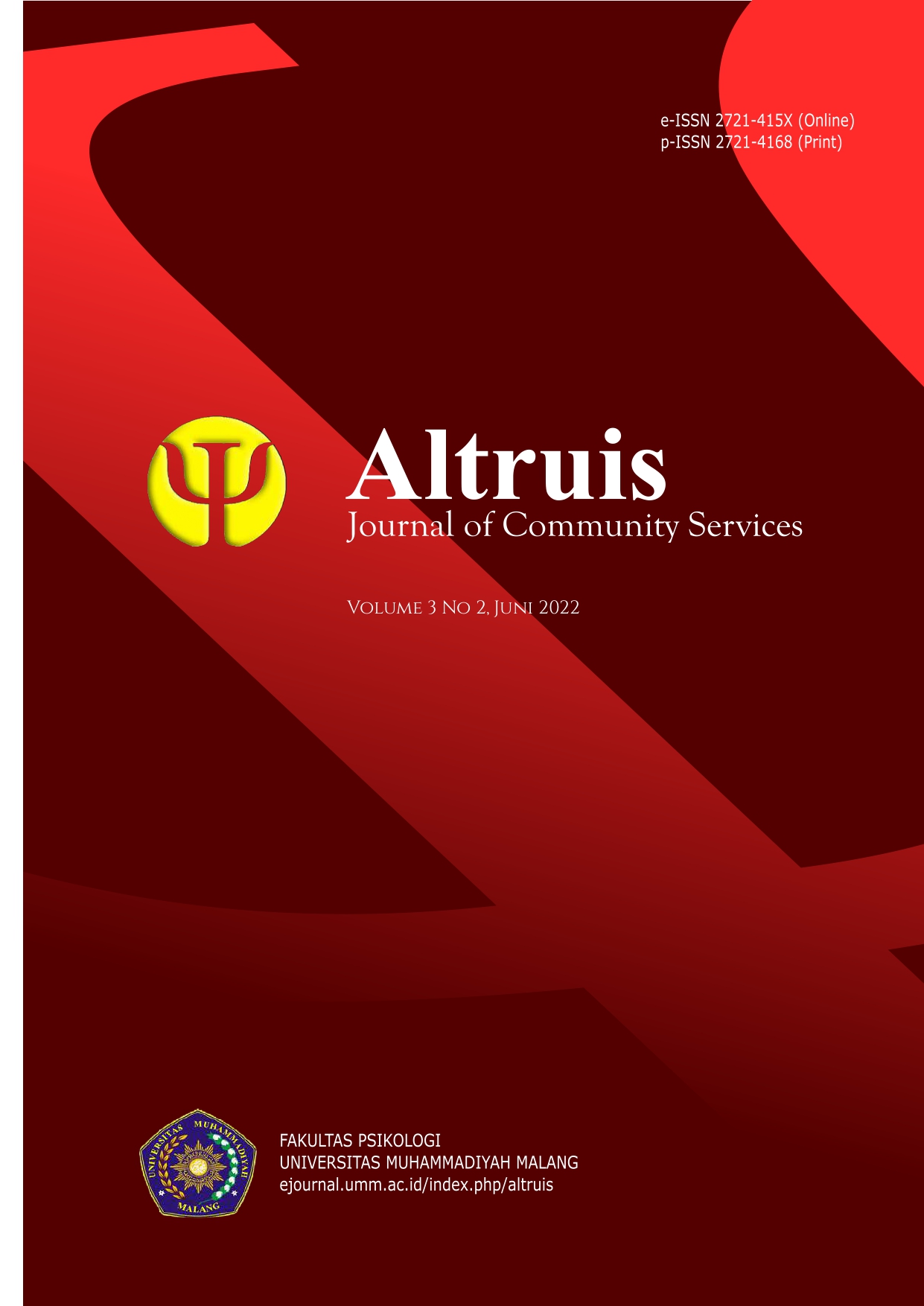Pemberdayaan duta anti narkoba Kota Malang melalui pelatihan dalam upaya peningkatan pengetahuan P4GN
DOI:
https://doi.org/10.22219/altruis.v3i2.20907Keywords:
Ambassador, Drugs, Knowledge, Narcotics, PreventiveAbstract
Narkoba is an abbreviation of narcotics and drugs/dangerous substances, this term has the same meaning as narcotics, psychotropic substances, and addictive substances (NAPZA) when consumed can affect the human body, especially in the central nervous system can causing disturbances in psychic, physical and social functions due to addiction. Continuous use of drugs outside of medical indications is called abuse. The Anti-Drug Ambassador of Malang City is a forum for those who are elected, who are not only competent but also smart, have good personalities and are attractive. The Anti-Drug Ambassador is a place to find cadres to carry out the task of preventing, eradicating, abusing and illicit narcotics trafficking (P4GN) to the community, which has various work programs and ways to invite people to stay away from drugs. The implementation method was carried out through several stages to determine the knowledge of the Anti-Drug Ambassador of Malang City, starting from the making of the material, the pretest stage, the coaching stage, and the post-test stage. From the results of filling out the questionnaire, the average value of pretest was 75.1 and posttest was 85.4, so it can be concluded that there was an increase in knowledge after being given training.
Downloads
References
Adam, S. (2012). Dampak narkotika pada psikologi dan kesehatan masyarakat. Komunikasi Penyiaran Islam IAIN Sultan Amai Gorontalo, 1(1), 1–8. https://doi.org/10.1017/CBO9781107415324.004
Alifia, U. (2020). Apa itu narkotika dan napza? Semarang: PT. Bengawan Ilmu
Azmiyati, S. R. (2014). Gambaran penggunaan NAPZA pada anak jalanan di Kota Semarang. KEMAS: Jurnal Kesehatan Masyarakat, 9(2), 137–143.
BNN. (2022). Data statistik penanganan kasus narkotika. Badan Narkotika Nasional RI. https://puslitdatin.bnn.go.id/portfolio/data-statistik-kasus-narkoba/
Hariyanto, B. P. (2018). Pencegahan dan pemberantasan peredaran narkoba di Indonesia. Jurnal Daulat Hukum, 1(1), 201–210. https://doi.org/10.30659/jdh.v1i1.2634
Hidayati, I. R., Atmadani, R. N., Putra, D. S., & Sari, A. M. (2022). Edukasi pencegahan HIV AIDS di lapas perempuan Kota Malang. Martabe: Jurnal Pengabdian Kepada Masyarakat, 5(1), 51–55.
Indonesia, P. (1997). Undang-Undang Republik Indonesia Nomor 5 Tahun 1997 Tentang Psikotropika. Undang Undang RI, 1, 7–40.
Indonesia, P. (2009). Undang-undang Republik Indonesia nomor 35 tahun 2009. 75, 31–47.
Iskandar, A., & IK, S. (2019). Penegakan hukum narkotika (rehabilitatif terhadap penyalah guna dan pecandu, represif terhadap pengedar). Elex Media Komputindo.
Lisa, J. (2013). Narkotika,psikotropika dan gangguan jiwa. Nuha Medika Yogyakarta.
Mubarak, W. I., Chayatin, N., & Rozikin, S. (2007). Promosi kesehatan sebuah pengantar proses belajar mengajar dalam pendidikan. Yogyakarta: Graha Ilmu, 30.
Notoatmodjo, S. (2012). Promosi kesehatan dan perilaku kesehatan. In Journal of Chemical Information and Modeling. https://doi.org/10.1017/CBO9781107415324.004
Putra, D. S. (2022). Psikoedukasi pola hidup bersih sehat pada siswa di lingkungan Rumah Belajar Kakek Aboe, Malang. Altruis: Journal of Community Services, 3(1), 128–131. https://doi.org/10.22219/altruis.v3i1.18357
Putra, D. S., Atmadani, R. N., & Hidayati, I. R. (2021). Relationship between knowledge level of HIV/AIDS patient with antiretroviral adherence in primary healthcare service in Malang city. Journal of HIV/AIDS & Social Services, 0(0), 1–18. https://doi.org/10.1080/15381501.2021.1961651
Saragih, R., & Simanjuntak, M. F. E. (2021). Penegakan hukum terhadap penyalahgunaan narkotika di Indonesia. Journal of Education, Humaniora and Social Sciences (JEHSS), 4(1), 98–105. https://doi.org/10.34007/jehss.v4i1.590
Silvanus, D. (2019). Peranan badan narkotika nasional kota samarinda dalam menanggulangi penyalahgunaan narkoba dikalangan pelajar (studi kasus di SMK Negeri 6 Samarinda). EJournal Sosiatri-Sosiologi, 7(3), 239–253.
Wilson, L. O. (2016). Anderson and Krathwohl–Bloom’s taxonomy revised. Understanding the New Version of Bloom’s Taxonomy.
Zulfa, A., & Pramono, T. (2019). Upaya Badan Narkotika Nasional (BNN) Kota Kediri dalam menanggulangi penyalahgunaan narkoba. Jurnal Mediasosian : Jurnal Ilmu Sosial Dan Administrasi Negara, 3(2), 213–235. https://doi.org/10.30737/mediasosian.v3i2.1359
Downloads
Published
How to Cite
Issue
Section
License
Copyright (c) 2022 Dimas Setyadi Putra

This work is licensed under a Creative Commons Attribution-ShareAlike 4.0 International License.
Authors who publish in Altruis agree to the following terms:
- For all articles published in Altruis, copyright is retained by the authors. Authors give permission to the publisher to announce the work with conditions. When the manuscript is accepted for publication, the authors agree to automatic transfer of the publishing right to the publisher.
- Authors retain copyright and grant the journal right of first publication with the work simultaneously licensed under a Creative Commons Attribution-ShareAlike 4.0 International License that allows others to share the work with an acknowledgment of the work's authorship and initial publication in this journal.
- Authors are able to enter into separate, additional contractual arrangements for the non-exclusive distribution of the journal's published version of the work (e.g., post it to an institutional repository or publish it in a book), with an acknowledgment of its initial publication in this journal.
- Authors are permitted and encouraged to post their work online (e.g., in institutional repositories or on their website) prior to and during the submission process, as it can lead to productive exchanges, as well as earlier and greater citation of published work (See The Effect of Open Access).
This work is licensed under a Creative Commons Attribution-ShareAlike 4.0 International License.


